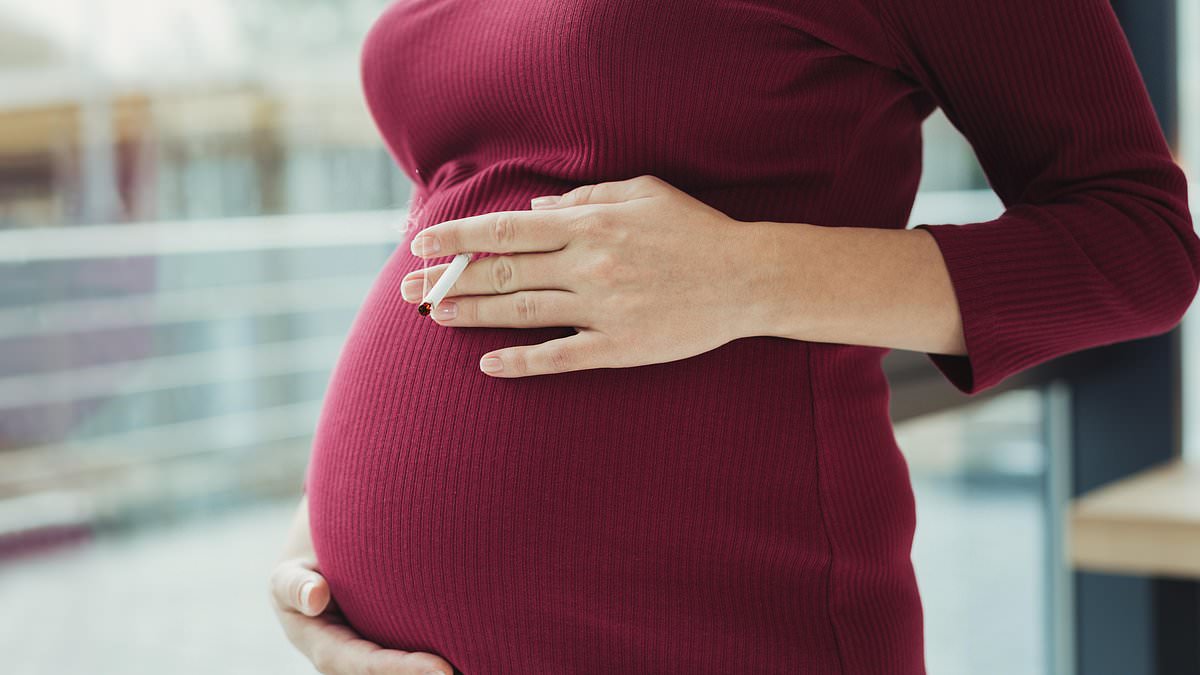Smokers are more likely to give up their habit and remain smoke-free if given rewards for doing so, a study reveals.
The incentives are particularly effective among pregnant women, who are twice as likely to quit when offered financial inducements.
Health campaigners say the ‘clear evidence’ should lead to the widespread roll-out of reward schemes for pregnant smokers.
They can take the form of cash payments, vouchers, or the return of money deposited by those taking part.
Such schemes are run in workplaces and clinics and sometimes as community programmes.
Smoking during pregnancy increases the risk of miscarriage and stillbirth and raises the odds of the baby being born underweight.
Research led by the University of East Anglia analysed 48 studies, involving 21,900 participants, that tested different reward schemes to help smokers quit.
For every 100 people who received financial incentives, ten people were likely to successfully quit smoking at six months or longer, compared to seven in 100 people who did not receive financial incentives.

The incentives are particularly effective among pregnant women, who are twice as likely to quit when offered financial inducements (stock image)

Smoking during pregnancy increases the risk of miscarriage and stillbirth and raises the odds of the baby being born underweight (stock image)
Success rates continued beyond when the incentives had ended.
Women who were pregnant and received rewards were much more likely to stop smoking than those in the control groups, both at the end of the pregnancy and after the birth of the baby (13 studies, 3,942 people).
For every 100 pregnant women who received financial incentives, 13 of those were likely to successfully quit smoking at six months or longer, compared to six in 100 who did not receive financial incentives.
Studies varied in the total amounts of rewards that were paid and there was no noticeable difference between trials paying smaller amounts (fewer than 100 US dollars) compared to those paying larger amounts (more than 700 US dollars).
However, the researchers noted that is hard to make a fair comparison in this situation because money has different levels of importance in different cultures, and the studies they looked at came from many different countries.
This made it difficult to compare results directly across the studies.
Lead author Professor Caitlin Notley, of UEA’s Norwich Medical School, said: ‘Smoking is the leading preventable cause of ill health and early death worldwide and quitting smoking is vitally important to help people live in good health for longer.
‘We wanted to find out if giving people rewards helps them to quit smoking in the long term.
‘We are now very confident that incentives help people, and pregnant people, to quit smoking better than not offering incentives.
‘The evidence also demonstrates that the effectiveness of incentives lasts even after rewards have stopped.’
The government is currently rolling out a national scheme to offer all pregnant women who smoke financial incentives alongside stop smoking support.
However, funding for this scheme is set to run out in March 2025, which campaigners fear could undermine the progress made in reducing maternal smoking rates.
The Smoking in Pregnancy Challenge Group – a coalition including the Royal College of Midwives and Royal College of Obstetricians and Gynaecologists among others – is calling on the government to extend the scheme for the duration of this parliament.
Professor Linda Bauld, a co-author of the review and co-chair of the SPCG, said: ‘Smoking during pregnancy is one of the leading causes of poor birth outcomes including stillbirth and miscarriage.
‘These findings show that financial incentives during pregnancy can more than double the chances of quitting smoking and that incentives are also effective for preventing women from relapsing to smoking postnatally.
‘This evidence supports the case for continued investment in the existing national financial incentive scheme for pregnant women in England.’
Jamie Hartmann-Boyce, another co-author from the University of Massachusetts Amherst, said: ‘People are more cautious in pregnancy about using a lot of the pharmacological interventions that are approved for smoking cessation.

Women who were pregnant and received rewards were much more likely to stop smoking than those in the control groups, both at the end of the pregnancy and after the birth of the baby (stock image)

The government is currently rolling out a national scheme to offer all pregnant women who smoke financial incentives alongside stop smoking support (stock image)
‘So that’s why we’re focused on ways that we can help pregnant people quit smoking.
‘There’s a lot of evidence to suggest that this intervention is acting on the psychological reward systems in the brain, which we know are heavily involved with nicotine addiction.
‘So, it’s not that these people could have quit anyway and then were paid and decided to do so.
‘A lot of people in these studies have tried to quit many times, they really want to quit and weren’t able to do so, and this helped them.’
Dr Clea Harmer, chief executive of the baby charity Sands and co-chair of the SPCG, said: ‘The evidence is clear that financial incentives are highly effective for helping pregnant women quit smoking and stay smokefree.
‘We urge the government to extend the national incentive scheme to ensure women and families get the support they need to have a smokefree pregnancy and a healthy baby.’
The findings of the study are published by the international medical review organisation Cochrane Review.









